- By Dan Veaner
- Around Town
 Print
Print  Seventy years ago last Tuesday Fred Voss came to America. He was 20 years old, and had escaped the Nazis with his parents and grandmother via Austria and England. They had no money or belongings -- the Nazis had taken everything they had. But they were the lucky ones. Six million of their fellow Jews had been murdered, and that was just a fraction of the 50 million people who lost their lives in the war.
Seventy years ago last Tuesday Fred Voss came to America. He was 20 years old, and had escaped the Nazis with his parents and grandmother via Austria and England. They had no money or belongings -- the Nazis had taken everything they had. But they were the lucky ones. Six million of their fellow Jews had been murdered, and that was just a fraction of the 50 million people who lost their lives in the war."Before we were expelled from the schools in Nazi Germany, we had lost our lives as human beings," Voss says. "We were dehumanized. We were forced to sit apart from our Christian classmates. No matter how well an essay was written by a Jewish student he never got an A or a B."
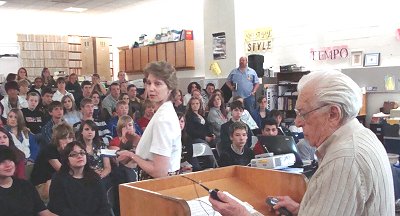
June Martin introduces Fred Voss to Lansing 10th Graders
On Wednesday Voss shared his horrific experiences with Lansing High School sophomores. He wasn't much older than they are now when the Nazis burned synagogues, murdered Jews and destroyed and plundered their property. That included his parents' textile store, and the apartment above it where he grew up. It included much of his family and many of his friends who were just children themselves at the time.
Voss was hosted by English teacher June Martin. This was the eighth time she has brought Voss to Lansing High School to speak to tenth graders.
Hearing Voss tell his story is one of the most chilling experiences possible, short of actually living through the atrocities he experienced. He is a strong, compelling speaker. His personal story transcends the dry recounting of the Holocaust you find in history books. In Voss's story the people who go to the concentration camps, the people who are murdered, the brave Christians who helped his family, and the Nazis are all real people that he knew. He shows pictures of them, of his childhood home, and of the Nazis burning a temple. It's real. It is his life.
And the students get it, and they remember. Voss was greeted by students in the hallways who had heard him in past years.
Elie Wiesel famously said, "I decided to devote my life to telling the story because I felt that having survived I owe something to the dead. and anyone who does not remember betrays them again." That sentiment is a long standing Jewish tradition -- indeed, the purpose of the Passover holiday is to remember another troubling time in Jewish history, to retell and remember the story of Exodus. Voss has noted that his generation is dying out and that soon there will be no actual survivors to tell the story of the Holocaust. That makes his appearances more important, because he says that when we don't know about the atrocities of the past we can't avoid repeating them in the future.
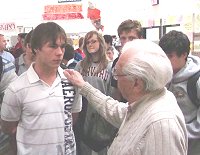 | 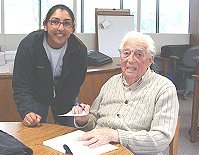 |
| After the presentation Voss spoke with students and autographed copies of his book. | |
Voss tailors the presentation for each audience, and his recounting to teenagers is especially gripping, because he tells it from his own point of view when he was a teenager himself. While visiting a cousin whose husband is taken by the Nazis on the night the synagogue in their town is burned down, he takes the train home, then back to his cousin's town, and then home again. "I didn't know what to do," he says. No teenager would.
Because he was still a kid, a lot of the people he knows who didn't survive were also kids. He notes that of the 40 students in his parochial school only seven lived after the Holocaust was done. Kids today may complain about a teacher from time to time, but what Voss suffered as a Jewish child in Germany is hard to imagine. You think, 'it could never happen here.' But that's what Germans thought n the 1940s.
"Some of our teachers wore black SS uniforms to school all the time," he says. "Other teachers simply harassed us, even in class, in front of everyone. I remember only too well when one of our science teachers told me to stand up one day so the rest of the class could see what a Jew looked like. I had a music teacher who always wore his black storm trooper uniform. It was his sick pleasure to have us Jewish students stand at attention while he made the class sing the infamous Nazi song, 'When Jewish Blood Gushes From Our Knives German Will Be So Much Better Off.'"
Voss has told his story in libraries, schools, synagogues, churches, Rotary Clubs, and many other organizations in New York and Pennsylvania. At 90 years old he says he has slowed down, only speaking locally. So far this year Voss has spoken at the Cortland Unitarian Church, Lansing United Methodist Church, the Alternative Community School, Lansing High School, and is scheduled to speak at Boynton Middle School next month.
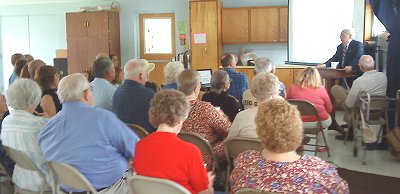
Voss spoke at the Lansing United Methodist Church two weeks ago
When he speaks for local organizations he requests payment in the form of a donation to the United States Holocaust Memorial Museum, of which he is a charter member. All the proceeds from his book, 'Miracles, Milestones, and Memories,' also go to support the museum. The book is temporarily out of print, but Voss says that it will be for sale again soon at lulu.com. Voss says that when the book reappears the proceeds will be divided among the museum and other worthy organizations that fight against discrimination.
After speaking students get a chance to ask questions. Inevitably one asks how he met his wife, Ilsa. "Somebody put you up to that!" he says to great laughter. Then he tells of their meeting in England when the few people that were left in her family escaped there from Austria, and the Voss family had just arrived. Next week the couple will celebrate their 64th anniversary.
All of that is what makes Voss's presentation immediate and chilling -- it's personal. When he tells his story it is hard not to imagine yourself in that situation: to have thugs come to your door and take your father away, to be humiliated daily not just by school bullies, but by your teachers, to see your place of worship torched by government officials while passive neighbors just stand by and watch.
Voss doesn't overdo it -- he just tells it as it was. Recounting his return to Germany as a U.S. Army serviceman, he recalls being stationed to a camp for people who had lived in the concentration camps. He said they were not much more than skeletons, and the army prepared a meal for them. But they had been starved for so long that many became ill for trying to eat too much too soon, with one even dying. "Who knew?" Voss says of that experience and the other horrifying sights he and other servicemen saw when they liberated the prisoners. Wagons full of skeletons and naked, dead bodies were so far beyond their ken that he says they couldn't understand what had happened at first. Even Voss couldn't understand, and he had lived through many of the atrocities.
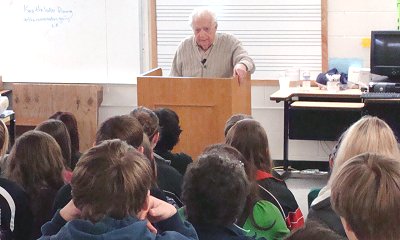
He is surprisingly generous, making sure his audience knows he is not talking about past or present Germans, but only about those who were part of the Nazi era. His message is that hate must be obliterated, wiped out of the human lexicon. He told the Lansing students Wednesday that they must speak up and act when they see acts of hatred, that they must not stand idly by like those who watched his temple burn.
"There must never be a time where we keep silent when other people suffer," he said.
----
v6i18



